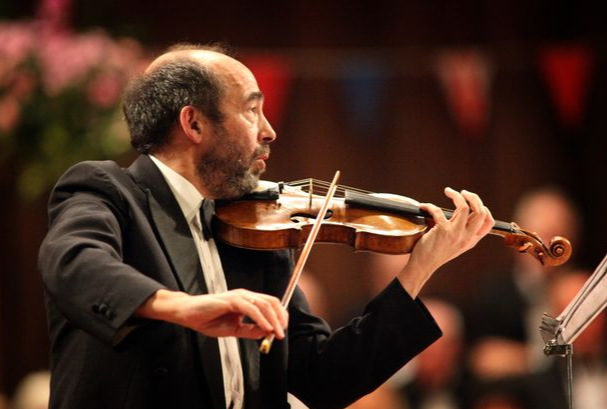March 18th 2023 – Bradley Creswick, playing Beethoven’s Violin Concerto, & Haydn ‘Nelson Mass’ and Te Deum
A Saturday evening concert in Sunderland Minster, starting at 7.30 p.m., conducted by David Murray.
Featuring a special guest performance by Bradley Creswick of Beethoven’s Violin Concerto

and Haydn Nelson Mass (No.11 in D Minor) and Te Deum (in C Major).
Soloists: Laurie Ashworth – soprano, Clare McCaldin – mezzo-soprano, Nick Smith – tenor, Patrick Owston – bass
Tickets – £14.00 for Nave (£8 concessions for full-time students and on income related benefits) or £8.00 (Gallery – limited view). Accompanied under 16s free. Tickets will be available from members of the Society, at the door, or on-line from www.wegottickets.com/BCS – who also have a direct link on the home page of this website.
Doors open from 6.45 p.m. Apart from seats marked for Patrons there are no allocated seats.
Bradley Creswick has been described as “an outstanding, internationally renowned, musician and leader of the Royal Northern Sinfonia orchestra who has endeared himself to audiences at the Sage Gateshead for the quality of his playing and his sheer enjoyment of the role.”
Now retired from RNS, he was appointed Leader Emeritus and more recently an MBE for services to music. Playing with friends remains a vibrant part of his life and he continues to give recitals across the UK. The Society is delighted that he can join us to perform Beethoven’s Violin Concerto, one of the best known violin concertos.
The Missa in angustiis (Mass for troubled times) or Nelson Mass, is one of fourteen masses written by Joseph Haydn. It is one of the six masses written near the end of his life which are, together, now seen as a culmination of Haydn’s liturgical composition. Haydn’s original title may also have come from illness and exhaustion at this time, which followed his supervision of the first performances of The Creation, completed a few months earlier. Though Haydn’s reputation was at its peak in 1798, when he wrote this mass, his world was in turmoil. Napoleon had won four major battles with Austria in less than a year. The previous year, in early 1797, his armies had crossed the Alps and threatened Vienna itself. In May 1798, Napoleon invaded Egypt to destroy Britain’s trade routes to the East.
The summer of 1798 was therefore a terrifying time for Austria, and when Haydn finished this mass, his own title, in the catalogue of his works, was Missa in angustiis (Mass for troubled times). What Haydn did not know when he wrote the mass, but what he and his audience heard, was that on 1 August, Napoleon had been dealt a stunning defeat in the Battle of the Nile by British forces led by Admiral Horatio Nelson. Because of this coincidence, the mass gradually acquired the nickname Lord Nelson Mass.
The Te Deum is a magnificent choral drama in three parts was a commission from Empress Marie Therese, the wife of Franz I of Austria. Haydn was a frequent visitor to the imperial palace in Vienna. The Empress had a good voice; Haydn once accompanied her on a private performance of the soprano part of The Creation. The Empress repeatedly used to ask Haydn for some specially-composed church music, but Prince Esterhazy was reluctant to allow his famous employee to write for anyone but himself.
Evidently, however, Marie Therese finally got her way – we know not how! The Te Deum was composed around 1799, but its first recorded performance was not until 1800 at Eisenstadt, the home of the Esterhazy family, to celebrate Lord Nelson’s (and, inevitably, Lady Hamilton’s) arrival there.
The Te Deum is a choral work throughout, without the solo sections that are heard in Haydn’s masses and other sacred works. Two lengthy Allegro passages surround a central Adagio, effectively making the work a concerto for chorus and orchestra.




